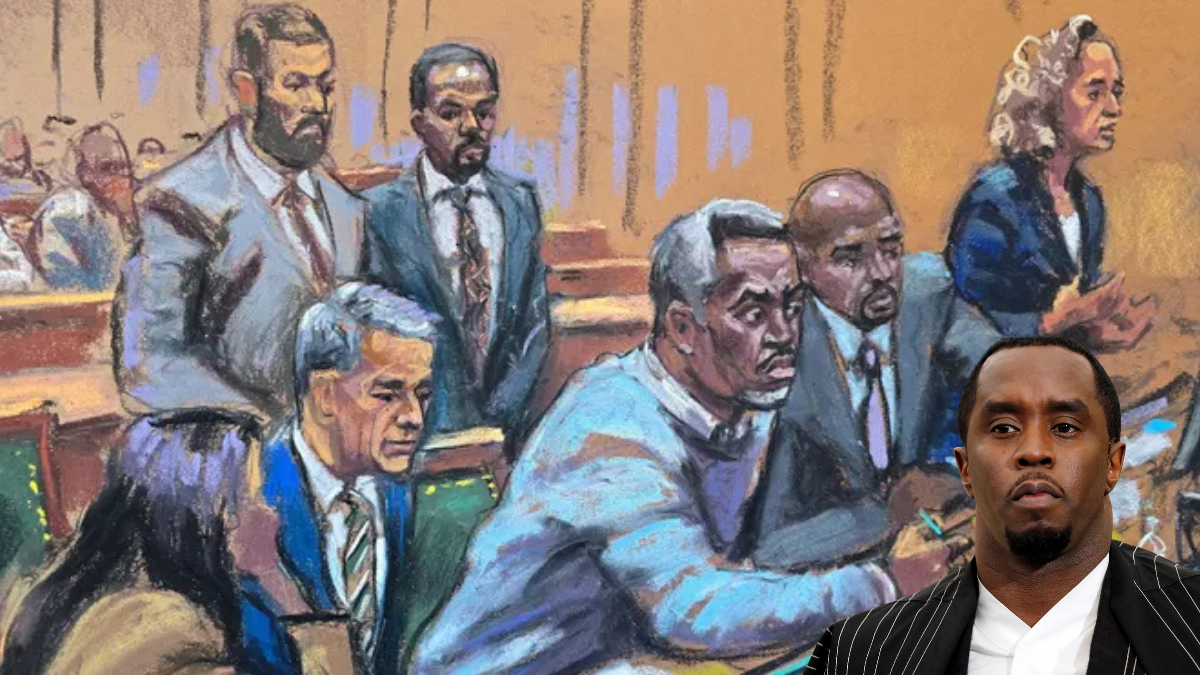Sean “Diddy” Combs Trial: The highly publicized sex trafficking and racketeering trial of Sean “Diddy” Combs reached a critical phase in June 2025, as closing arguments wrapped up after seven weeks of intense testimony. The hip-hop mogul, known for his larger-than-life persona, faces serious charges that could lead to life in prison. Here’s a deep dive into the closing arguments, the allegations, and what’s at stake as the jury prepares to deliberate.
The Prosecution’s Case: A Criminal Enterprise Fueled by Power and Fear
Sean “Diddy” Combs Trial
Assistant U.S. Attorney Christy Slavik delivered a nearly five-hour closing argument, painting Combs as the head of a sprawling criminal enterprise. She argued that Combs used his wealth, fame, and influence to orchestrate a decades-long scheme involving sex trafficking, forced labor, and other crimes. “He doesn’t take no for an answer,” Slavik told the jury, emphasizing that Combs relied on “power, violence, and fear” to manipulate his alleged victims, including ex-girlfriends Cassie Ventura and a woman identified as “Jane.”
Slavik detailed how Combs allegedly coerced women into participating in drug-fueled sexual encounters, referred to as “freak offs” or “hotel nights.” These events, she claimed, were not consensual but rather orchestrated through threats, financial dependency, and physical violence. For instance, Ventura testified about a 2016 assault captured on hotel surveillance, where Combs was seen punching and kicking her, allegedly to force her participation in a “freak off.”
Evidence of a Criminal Network
The prosecution highlighted Combs’ inner circle, including his former chief of staff, Kristina Khorram, and security guard D-Roc, as key enablers. These “loyal employees” allegedly facilitated the crimes by arranging travel for escorts, procuring drugs, and covering up incidents, such as a $100,000 payment to a hotel security guard for footage of the 2016 assault on Ventura. Slavik argued this was clear evidence of bribery and obstruction of justice.
Slavik also pointed to specific incidents, like the alleged arson attack on rapper Kid Cudi’s car in 2012, which she linked to Combs’ jealousy over Cudi’s brief relationship with Ventura. “Of course, the defendant was behind this,” she told jurors, noting Combs’ later apology to Cudi as an admission of guilt.
Forced Labor and Psychological Manipulation
Beyond Ventura and Jane, the prosecution argued that Combs’ former assistant, “Mia,” was a victim of forced labor. Mia testified about enduring physical and sexual abuse, living in constant fear of losing her job or safety. Slavik emphasized that the women were trapped in a “climate of fear,” unable to leave due to financial coercion and a “trauma bond” with Combs.
The Defense’s Strategy: Consensual Relationships, Not Crimes
Reframing the Narrative
Combs’ defense team, led by Marc Agnifilo, is set to present its closing arguments on Friday, June 27, 2025. Throughout the trial, they’ve argued that the sexual encounters were consensual, part of Combs’ “swinger lifestyle,” and not indicative of sex trafficking. They’ve pointed to text messages showing Ventura and Jane expressing enthusiasm for some “hotel nights,” suggesting they were willing participants.
The defense has also downplayed the violence, framing it as domestic disputes rather than evidence of a criminal enterprise. “Domestic violence is not sex trafficking,” attorney Alexandra Shapiro argued, emphasizing that Combs’ employees were unaware of any illicit activities in the hotel rooms.
A Brief Defense Case
Notably, the defense rested after just 20 minutes, choosing not to call witnesses and relying instead on cross-examinations and text message evidence. Legal experts suggest this strategy aims to highlight weaknesses in the prosecution’s case without risking new testimony that could backfire.
What’s Next: Jury Deliberations and Potential Outcomes
The Charges and Stakes
Combs faces five counts: one for racketeering conspiracy, two for sex trafficking by force, fraud, or coercion, and two for transportation to engage in prostitution. A guilty verdict on any count could result in a lengthy prison sentence, with the racketeering charge carrying a potential life sentence.
To convict on racketeering, jurors must find that Combs conspired to commit at least two predicate acts, such as drug distribution, bribery, or forced labor. Slavik stressed that even one coerced “freak off” could suffice for a sex trafficking conviction.
Deliberations and Public Reaction
With closing arguments concluding, the jury is expected to begin deliberations as early as Friday afternoon, following the defense’s presentation and a prosecution rebuttal. Public sentiment, as reflected on platforms like X, shows divided opinions, with some supporting Combs and others demanding accountability for the allegations.
Why This Case Matters
The Combs trial isn’t just about one man—it’s a reckoning for power dynamics in the entertainment industry. The allegations highlight how wealth and influence can shield misconduct, a theme that resonates with broader cultural conversations about accountability. As Slavik told jurors, “Up until today, the defendant was able to get away with his crimes because of his money, his power, his influence. That stops now.”
Looking Ahead
As the jury deliberates, the world watches to see whether Combs will face justice or walk free. The outcome could set a precedent for how similar cases are prosecuted, especially those involving high-profile figures and racketeering charges, as seen in cases against R. Kelly and Keith Raniere.
For now, the focus remains on the evidence: testimony from 34 witnesses, incriminating videos, and a trail of financial records. Whether the jury finds this sufficient to convict remains to be seen, but the trial has already left an indelible mark on the public consciousness.
